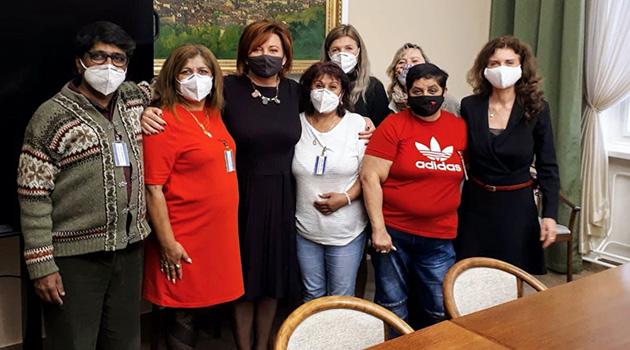Czech Finance Minister supports bill to compensate illegally sterilized women

Czech Finance Minister Alena Schillerová (ANO) met last week at the ministry in Prague with non-Romani and Romani women who have been unlawfully sterilized and who have been fighting for compensation for many years. During the meeting, the women shared stories of what was done to them to underscore the importance of the bill to compensate victims of illegal sterilizations that has been in the lower house for almost one year and has yet to undergo a first reading.
News server Romea.cz has been informed that the Finance Minister promised the women she would support the bill to compensate those who have been illegally sterilized. Elena Gorolová, the spokesperson for the group of unlawfully sterilized women, told news server Romea.cz that she welcomed the minister’s accommodating approach to adoption of the bill; Gorolová works for the Ostrava-based organization Life Together (Vzájemné soužití).
“The minister listened to us all and also took an interest in why we had not gone to court about what happened to us years ago. [Czech Deputy Public Defender of Rights] Monika Šimůnková explained that the women had been ashamed of what happened to them and didn’t want to speak about it publicly,” Gorolová told Romea.cz, adding that the five non-Romani and Romani women sterilized without their free and informed choice and consent also met with several lower house lawmakers who listened to what they had to say and expressed support for their compensation.
“Minister Schillerová’s final statement was that she will support compensation,” Gorolová told news server Romea.cz, adding that the bill has unfortunately not yet been read in the lower house. “We got an e-mail explaining that because several members of the lower house have coronavirus, they were absent [from the current session], so the first reading is being postponed,” said Gorolová, who hopes the law will eventually be approved and the forced sterilization victims who are still alive will receive compensation of CZK 300 000 [EUR 11 000].
The bill has been supported by Deputy Public Defender of Rights Monika Šimůnková, who is asking lawmakers to adopt it upon a first reading. According to her, the law is currently the only opportunity for the women who have been harmed to receive justice, as suing in court is not likely to result in compensation for procedural reasons.
Czech Public Defender of Rights Otakar Motejl raised the issue of this injustice in a report in 2005 that described cases of women having been sterilized either completely without their consent or under circumstances in which the consent they gave could not be considered either genuinely of their own free will or fully informed. Those women have not been compensated to this day – many have struggled with serious medical problems in the interim, and many have already passed away.
Seeking financial compensation in such cases is subject to a statute of limitations, which means there would not be any point to the women attempting to defend their rights by taking legal action. “The bill that has been drafted is the last opportunity the state has, after 20 years, to correct this injustice at least somewhat. These sterilizations that were not freely chosen are some of the worst violations of personal integrity that the state has committed. For that reason, I would like to ask the members of the lower house to bring this bill up for a first reading during the current session. These women deserve it,” reads a press release from the Office of the Public Defender of Rights.
In 1971, the practice of sterilization was regulated as state policy in Czechoslovakia on the basis of the adoption of a directive on its performance. At the time that directive was in effect, Romani women were systematically sterilized without their full and informed consent as a means of controlling their birth rate.
According to Gorolová, forced sterilizations did not end when the various legal regulations governing the incentivizing of sterilizations during communism ended, but sterilizations also continued to be performed illegally for several years afterward, and the most recent known case of a Romani woman being coerced into sterilization happened in 2007. In 2009, the Fischer cabinet expressed regret over these practices.
